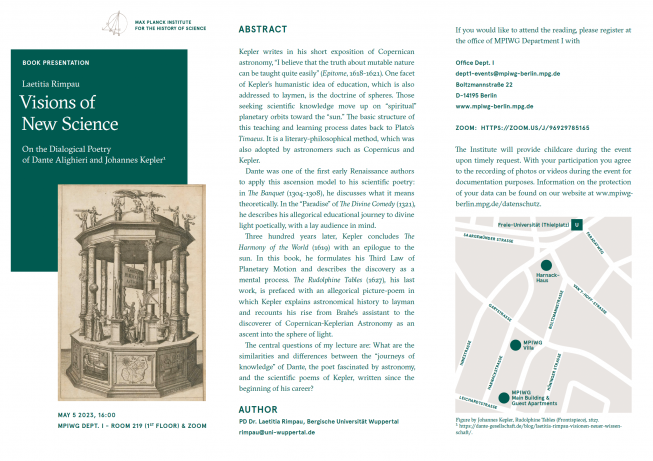May 5, 2023
Visions of New Science: On the Dialogical Poetry of Dante Alighieri and Johannes Kepler
- 16:00 to 18:00
- Book Presentation
- Laetitia Rimpau
This event was rescheduled from March 30, 2023
Kepler writes in his short exposition of Copernican astronomy, “I believe that the truth about mutable nature can be taught quite easily” (Epitome, 1618-1621). One facet of Kepler’s humanistic idea of education, which is also addressed to laymen, is the doctrine of spheres. Those seeking scientific knowledge move up on “spiritual” planetary orbits toward the “sun.” The basic structure of this teaching and learning process dates back to Plato’s Timaeus. It is a literary-philosophical method, which was also adopted by astronomers such as Copernicus and Kepler.
Dante was one of the first early Renaissance authors to apply this ascension model to his scientific poetry: in The Banquet (1304-1308), he discusses what it means theoretically. In the “Paradise” of The Divine Comedy (1321), he describes his allegorical educational journey to divine light poetically, with a lay audience in mind.
Three hundred years later, Kepler concludes The Harmony of the World (1619) with an epilogue to the sun. In this book, he formulates his Third Law of Planetary Motion and describes the discovery as a mental process. The Rudolphine Tables (1627), his last work, is prefaced with an allegorical picture-poem in which Kepler explains astronomical history to layman and recounts his rise from Brahe’s assistant to the discoverer of Copernican-Keplerian Astronomy as an ascent into the sphere of light.
The central questions of my lecture are: What are the similarities and differences between the “journeys of knowledge” of Dante, the poet fascinated by astronomy, and the scientific poems of Kepler, written since the beginning of his career?

Contact and Registration
If you would like to attend the reading, please register at this email address: dept1-events@mpiwg-berlin.mpg.de
Zoom Link: https://eu01web.zoom.us/j/64427914404
The Institute will provide childcare during the event upon timely request.
With your participation you agree to the recording of photos or videos during the event for documentation purposes.
Information on the protection of your data can be found on our website at ww.mpiwg-berlin.mpg.de/datenschutz.
